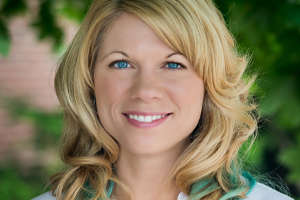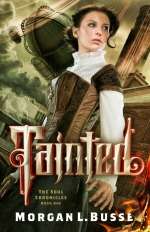Morgan Busse, no stranger to speculative fiction, is now delving into the sub-genre of steampunk with Tainted (Gilead Publishing), the first volume in her new series Soul Chronicles. Steampunk–which fuses together historical elements with science fiction and fantasy–has been embraced by several Christian authors, including Evangeline Denmark (Curio), Shelley Adina (Magnificent Devices), JC Morrows (The Order of the Moonstone) and Christopher Hopper (The Sky Riders).
Why choose to write steampunk?
 What I love about steampunk is the possibilities. Steampunk isn’t just science fiction or Victorian. It can have magic if you want. Or you can borrow from the time period of your choice without being confined to it or to the technology that existed. If you want to invent some kind of steam-powered cell phone, go for it!
What I love about steampunk is the possibilities. Steampunk isn’t just science fiction or Victorian. It can have magic if you want. Or you can borrow from the time period of your choice without being confined to it or to the technology that existed. If you want to invent some kind of steam-powered cell phone, go for it!
What makes it so different that you wanted to specifically write steampunk and not fantasy like your other series?
The thing that sets Steampunk apart from other genres—both visually and in-story—is the feel. Steampunk has a feel of fantastical inventions, adventure, and science/discovery. Usually cogs, clocks, corsets, goggles, airships, and alchemy are associated with steampunk stories. But you don’t have to have any of those if you don’t want to. Have fun and create your own technology, weapons, and culture.
What are some unique things or aspects of the genre that you brought into your series?
 My own steampunk series borrows heavily from the Victorian era and science. I also had fun inventing things such as mechanical animals, an airship that runs on solar panels, a sniper rifle hidden within a walking cane, and a prosthetic arm that functions as an electric cannon.
My own steampunk series borrows heavily from the Victorian era and science. I also had fun inventing things such as mechanical animals, an airship that runs on solar panels, a sniper rifle hidden within a walking cane, and a prosthetic arm that functions as an electric cannon.
Like any other genre, the story cannot stand on just the genre underpinnings. What connects the reader to the story is the story itself, with characters the reader can relate to. So while you’re having fun inventing your steampunk world, remember to tell a story, one that will grip your readers by the heart and mind.
Do you find it hard to include a biblical perspective and be accurate when writing speculative fiction?
I don’t find it hard to be accurate. I am a visual person, and so when I teach, I use visual ideas to help people grasp Biblical concepts. Naturally, that comes into my writing as well. I don’t preach in my stories, I show who God is, what sin is and what it does to us, and what sacrificial love is by telling a story. The great thing about fantasy is you can actually show it.


